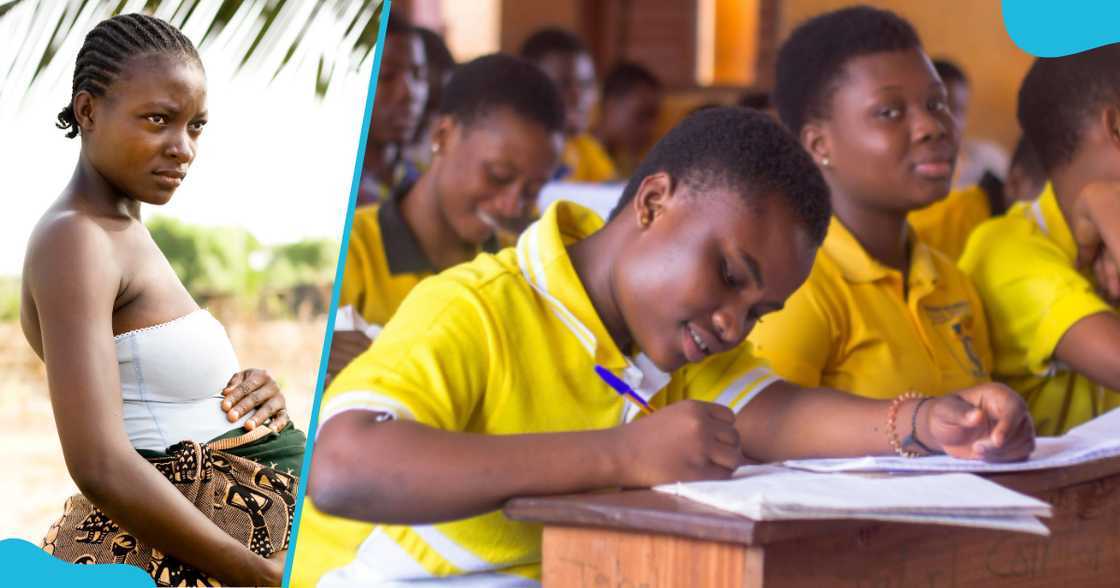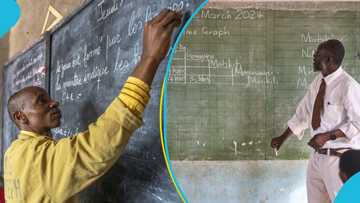BECE Girls Getting Pregnant: Teachers, NGOs Raise Alarm in Ghana
- Ghana’s Girl-Child Education Unit in the Eastern Region is struggling due to a lack of resources and parental support
- Teen pregnancies, poverty, and neglect are forcing many girls, especially in Akuapem North, to drop out of school
- Coordinators and NGOs are stepping in, but limited funding and community pressure continue to hinder lasting change
A lack of resources for the Girl-Child Education Unit under the Ghana Education Service is hindering its core mandate of supporting school-going girls in the Eastern Region.
Coordinators in charge of the unit at the district level are forced to run its affairs using their own resources.

Source: UGC
A coordinator described the experience as disappointing
The government’s policy on girl-child education is documented in the Free Compulsory Universal Basic Education (FCUBE) Programme of 1995.
The third component of the programme, Access and Participation, emphasises gender equity and high retention rates for the girl-child throughout Basic Education.

Read also
Nigerian man criticizes government over poor education system, urges emulation of Ghana’s approach
It aims to eliminate or reduce barriers, especially pregnancy, that push girls out of classrooms.
FCUBE promotes educational activities
To achieve this, the programme promotes educational activities that equip the girl-child with essential knowledge on menstrual hygiene and sexual abstinence at the school level.
However, since its inception, the unit at the district level has struggled to meet its objectives of ensuring high retention for the girl-child throughout Basic School.
Over the years, many school-going girls have dropped out in the Akuapem North Municipality due to pregnancy.
The situation slightly improved but worsened during the COVID-19 pandemic.
In 2021, records from the Municipal Education Office showed 57 pregnancies among basic school students and 34 among SHS students.
In 2025, three BECE candidates were pregnant, compared to 12 in 2024 and 22 in 2023. SHS recorded two pregnancies in 2024 and 11 in 2023.
A Junior High School teacher named Gloria revealed that some girls as young as 13 years old are already on family planning.
She believes sexual abstinence education alone cannot solve the problem.
“Some of the girls live in their boyfriends’ homes. Some parents are irresponsible. They don’t know what their children eat, where they sleep or how their fees are paid. With such girls, can you preach only abstinence if you still want them in school?” she asked.
“It’s difficult to get the pregnant girls' full attention in class. They are not immune to the challenges of pregnancy, and for most of them, the condition negatively affects their academic performance,” Gloria added.
A third-year student named Comfort said the birth control method she used affected her menstrual cycle, forcing her to discontinue, and she later got pregnant.
“Sometimes I had three or four continuous weeks of heavy flow. I felt I was dying, so I reported and was given medicine, but it didn’t help, so I had to remove it. I got pregnant two months later. My parents aren’t supportive. If they were, I wouldn’t be in this situation,” she said.

Read also
Ghanaians delight as nine inmates from Manhyia Prison get scholarships to study at Jackson University College
She stayed in school, wrote all her exams, and delivered during the examination period.
What the Ghana Health Service is doing
The Ghana Health Service visits schools occasionally, offering education on menstrual health, birth control, personal hygiene, and sanitary pad use.
This has encouraged some girls to choose family planning to prevent pregnancy.
A nurse who requested anonymity said the aim is to educate, not to promote the practice.
“Some girls come on their own, others with their mothers, but we don’t induce them. We educate,” the nurse noted.
Lack of parental support
Despite interventions, root causes such as irresponsible parenting and unemployment remain unaddressed.
Due to their parents’ inability to provide basic needs, some girls rely on boys, especially okada riders, in exchange for sex.
Once they start receiving financial support, they remain with the boys. Some parents knowingly or unknowingly approve.
“I want to stop but I can’t. If I do, I won’t get the support. It’s the guy who takes care of me,” a 14-year-old student said.
During a recent Menstrual Hygiene Day celebration, a Form Two student revealed she had never used a sanitary pad since she began menstruating.
“This is my first time touching a pad since I started menstruating three years ago. My parents don’t buy them. I use my mother’s old clothes,” Faustina said.
Kaga’s Foundation GH supports girls
Before the Free Sanitary Pad Programme was launched by President John Dramani Mahama on April 24, 2025, Kaga’s Foundation GH, a nonprofit, supported students.
The foundation goes school to school in rural Akuapem North, teaching girls how to sew reusable sanitary pads.
However, due to limited funding, it cannot cover many schools.
Kaga’s Foundation GH leader, Abigail Nana Yaa Agyeiwaa, a classroom teacher, said the goal is to offer affordable and hygienic solutions for managing menstruation.
“Most girls don’t have access to pads. They stay home or use unhygienic methods. With reusable pads, they can afford to stay in school,” Abigail said.
“It relieves them of the burden of buying expensive pads. Some girls end up depending on men for pads,” she added.
Victims denied justice
Lack of family support hampers prosecution in abuse cases, often denying victims justice.
As part of outreach, the coordinator visits student-mothers and encourages them to return after delivery. Those above 18 usually don’t return. For them, pregnancy means marriage.
Coordinator Gifty Ashun narrated how a 35-year-old man impregnated a 15-year-old girl. The man was arrested, but opinion leaders pressured the family to drop the case.
“When families withdraw support, the case is dismissed. There’s nothing I can do in such cases,” she said.
In another case, a primary six student was impregnated by the School Management Committee Chairman of the same school.
While pursuing justice, she received threats and was forced to abandon the case.
“I had to withdraw,” she said. “The risk was massive and the stigma too much.”
Ashun said despite her passion to keep girls in school, lack of funds hinders her work.
“I don’t receive support from anywhere. We want to work, but the help isn’t coming. We don’t want any girl to drop out, but without resources, we can’t follow up. After delivery, most girls stay home,” she explained.
She appealed to parents to be productive and provide for their children, and urged girls to avoid over-dependency.
“Take your time in life. There will be challenges. Overcome them to become who you want to be. Don’t depend on a boy to survive,” Ashun advised.

Source: UGC
21 pregnant girls sit for BECE
Earlier, YEN.com.gh reported that 21 pregnant girls and 17 nursing mothers were among the candidates for the 2025 BECE in the Upper East Region, according to the Ghana Education Service.
Nathaniel N-yaaba gave the assurance that these candidates received full GES support, with no disturbances reported during the exams.
The 2025 BECE covered 744 schools and 90 centres, with 13 hearing-impaired students among the 19,523 candidates who sat for the exams.
Source: YEN.com.gh






